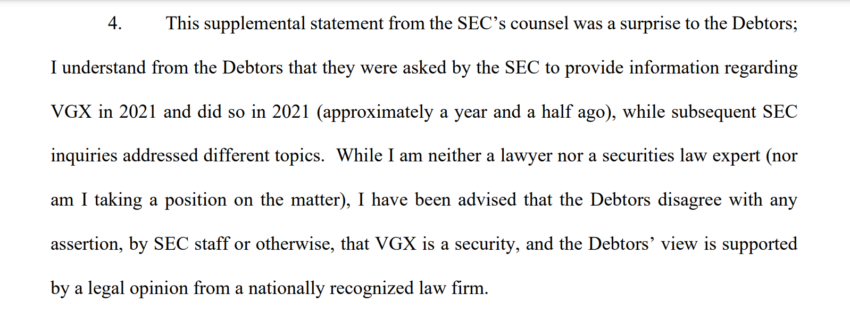Voyager bankruptcy Judge Michael Wiles has blocked the U.S. Securities and Exchange Commission from punishing Voyager executives and bankruptcy advisers concerning a new crypto asset included in the firm’s restructuring plan.
Judge Wiles said that the threat of future regulatory action against the individuals appointed to Voyager’s restructuring plan would stall the bankruptcy proceedings.
Voyager Amends Plan to Limit Bankruptcy Protections for Executives
His comments stem from U.S. bankruptcy law, which protects specialists involved in a bankrupt firm’s restructuring plan from legal action.
The law’s broad strokes mean that Voyager employees could contravene American securities laws, SEC lawyer Therese A. Scheuer argued. Attorneys for Voyager agreed to limit the immunity level by minorly rewording the bankruptcy plan.
Voyager adviser Mark Renzi said, “debtors will comply with any laws if applicable rules enacted or promulgated in the future.”
The ruling comes as a hearing on whether to allow Binance.US’ acquisition of Voyager Digital winds down in the Bankruptcy Court of the Southern District of New York.
Voyager filed for bankruptcy in July 2022 after bankrupt hedge fund Three Arrows Capital defaulted on a $660 million loan. It recently agreed to sell itself to Binance.US for $1.02 billion.
The SEC had previously objected to the sale, arguing that Binance.US was running an unregistered securities exchange in the U.S. It also alleged that any asset distribution after the sale could violate federal securities laws.
Recent media reports surrounding the exchange’s alleged involvement in money laundering and other crimes would make the deal “difficult to consummate,” the agency also argued.
Crypto Lawyer Question’s SEC’s Motives in Voyager Case
Crypto lawyer John Deaton, who successfully argued to limit the SEC’s reach into secondary sales of LBRY’s LBC token, spoke to BeInCrypto regarding the SEC’s objections.
“The Voyager Bankruptcy is another example of the SEC pursuing its anti-everything crypto agenda. It’s also another example of a federal judge calling out the Lawyers from the SEC because they have abandoned not only the law but the investors they took an oath to protect,” he said in a written email response.
“The truth is the distribution could not – by law – be truly considered an unregistered securities offering because it is a distribution being made in a bankruptcy court proceeding. Ask yourself, who is the SEC protecting here? It’s certainly not investors.”
Wiles had previously argued that these objections presented no concrete evidence to oppose the sale and rejected a request by SEC attorney William Uptegrove for an ex parte consultation.
Voyager Bankruptcy Costs Creditors $10 Million Per Month
Renzi said today that the SEC’s delays cost the firm $10 million monthly that could be repaid to creditors.

He also denied allegations by SEC staff that Voyager’s VGX token was a security, citing earlier disclosures the firm made to SEC upon request. Furthermore, he affirmed that “nationally recognized” lawyers had confirmed that VGX was not a security.

Advisers and other bankruptcy professionals generally get paid before the bankrupt firm’s creditors.
A report by CNBC in December 2022 revealed that the CEO of defunct crypto exchange FTX, bankruptcy expert John J. Ray III, was collecting $1,300 per hour as an independent contractor, earning $250,000 per month, taking into two weeks of vacation per year. He took over as CEO when the exchange filed for bankruptcy in November 2022.
Kathryn Schultea and three other advisers earn about $5.9 million annually. These contractors, together with Ray, cost FTX about $8.5 million annually.
Judge Wiles must agree to allow the Voyager sale by March 6, 2023, failing which the deal could fall through.
For Be[In]Crypto’s latest Bitcoin (BTC) analysis, click here.
Disclaimer
In adherence to the Trust Project guidelines, BeInCrypto is committed to unbiased, transparent reporting. This news article aims to provide accurate, timely information. However, readers are advised to verify facts independently and consult with a professional before making any decisions based on this content. Please note that our Terms and Conditions, Privacy Policy, and Disclaimers have been updated.


